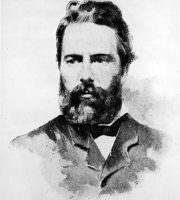by Dennis Nurkse
We drove down a road cut
in the center of a disused highway.
Southward through that ferrous moraine
billboards flew backwards,
mossed-over, streaked with moldâ
one showed a man on his knees
presenting a ring to a woman
whose face had peeled back to plywood.
No traffic. Long winding tunnels.
Pine torches: the moth people,
camping since the war.
We touched each other lightly.
What if we hit a child?
Would we dare stop?
For we were speeding,
sometimes glancing in joy at the needle
trembling before the highest zero.
We slept in a motel
with the motif of the anti-wave
embossed in the ashtray and drapes.
We rested at a Bauhaus campus
where the anti-tsunami was rendered
as a small mechanical fountain
at the center of a concrete plaza.
There were no students.
Next night we spent in a B & B
âthe anti-wave was a Hokusai print
with an ersatz Mount Fuji;
a rhinestone child was fishing
in a black velvet sequined ocean.
We kissed politely, perfunctorily,
as if the unwavering white line
were ruled in our bodies also,
and then lay listening for rain.
We thought, itâs human like us.
That helped us sleep without dreams.Â
2
Remember the old days, when we protested?
Those meetings were packed:
unions, churches, synagogues, mosques,
with their great banners warning:
if Coriolis turns, it will be too late.
The speaker said:
if you each convince two friends,
and they each convince two friendsâŠ
But it was just us, hand in hand:
sometimes in those surging crowds
we thought to see a high school friend,
an old dentist, a track coach,
but when we came closer
we saw they were an exact copy,
not the person. Or a strange shame
kept us from acknowledging them.
Even then, museums were devoted to the anti-wave.
The walls whitewashed, dazzling,
the floors colonial oak, obsessively varnished.
No velvet ropes: just a dozen tasteful dioramas,
the consequence glittering in electronic spume.
Even then, the lowlands were emptying.
In storefront churches
the anti-tide was worshiped as judgment.
It was chiseled on tombstones.
Once we found a penny
with the anti-tsunami instead of Lincoln,
the reverse already worn smooth.
Even then, if people mentioned it,
they said, unimaginably swift,
but less so than you expectedâ
but what could they know?
The whole idea of space and time
was between us and it.Â
3
In the plains we found a drive-in
and parked and ordered popcorn.
On the screen the violence of waiting
revealed itself with an eloquence
we could never have imagined.
We made love as I always wanted to
in those few feet of hard breath
behind the gem-like dials.
There were no other customers.
The clerk who took our sheaf of piastres
had been too listless to count them.Â
4
At Gilead the billboards changed:
sometimes an old couple,
she pushing him in a wheelchair,
sometimes just great blurred figures
you knew by instinct were naked.
The lights of the city
hardened in the night sky.Â
5
So we passed the outskirts,
the zone of mock-Tudor libraries
consecrated to Anthropocene,
the history of its thousand thresholds,
how its parameters correlate
in the mind, numbers, language,
the recurring dreams of childhood,
the trembling of foliage:
its causes, the attempts to stop it,
the counter-theories, the solutions:
freighters full of iron filings:
green algae: the brick in the toilet:
the calibrated showerhead:
methane traps, fermented corn husks.
Wreathed in ribbon wire,
the Institutes that measure height and speed,
pressure, velocity, potential whirlpools.
Buttressed rectangular buildings
with an occasional high window still lit
where the simulations are stored,
the print-outs, the papier-maché models.
Once we actually saw a worker
in a high office, scribbling calculations
under a gooseneck lamp
and we thought, âeven here,â âas in childhood.â
We passed the riverfront warehouses
where the speeches, petitions, protest letters
are savedâfor nothing has ever been destroyed.
Zinc-windowed facades scrawled with letters,
fragments of huge names, impossibly stylizedâ
we recognized âThor,â âShiva,â
here and there plywood was pried from a window
so you could see clear to the next highway.Â
6
The landscape flattened as if ruled
by a spirit level, the last dusty gingkos vanishedâ
surely some were art projects made of recycled tinâ
we passed a padlocked aquarium.
In a doorway an old woman knitting
glanced up as we slowed to wave,
but bit her lip and bent to her work
as if a secret were being revealed there.
Mile after mile of empty compound,
padlocked resorts, mini golfs in the moonlight,
giant concrete Squids and Porpoises,
drained swimming pools with high twisting slides.
We arrived at the place where the sea once was,
basalt littoral strewn with volutes,
latticed arabesque grooves where shells
had crumbled and blown away, wisps of nori,
blocky hermit exoskeletons, whorled conches.
The car jolted a little, the task
soon overâwe drove toward sunrise,
sometimes touching each other on the cheek
or the thigh, our wheels swerving
imperceptibly of their own accord, hydroplaning.
A curtain of spray rose around us.
At first light we braked and clambered out,
a little dizzy under the towering horizon.
Damp sand bunched between our toes.
Braided rubbery kelp chambers
popped under the balls of our feet.
The car dwindled behind us.
The haze of towers dimmed.
A new cold rose to our ankles.
We kissed, thanked each other,
and stumbled on, righting each other
with a hand to the elbow,
salt at our thighsâahead of us
a buoy tolling at the horizon,
and rising in the west, Anti-Earth,
the planet on which we live forever.





